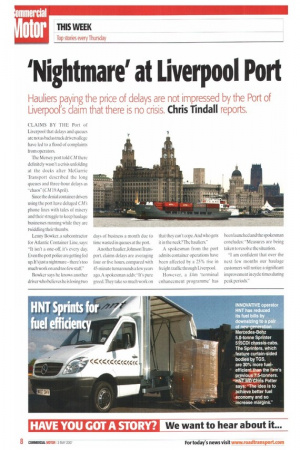'Nightmare' at Liverpool Pod
Page 8

If you've noticed an error in this article please click here to report it so we can fix it.
Hauliers paying the price of delays are not impressed by the Port of
Liverpool's claim that there is no crisis. Chris Tindall reports.
CLAIMS BY THE Port of Liverpool that delays and queues are not as bad as truck drivers allege have led to a flood of complaints from operators.
The Mersey port told CM there definitely wasn't a crisis unfolding at the docks after McGarrie Transport described the long queues and three-hour delays as chaos" (CM 19 April).
Since the denial container drivers using the port have deluged CM'S phone lines with tales of misery and their struggle to keep haulage businesses running while they are twiddling their thumbs.
Lenny Bowker, a subcontractor for Atlantic Container Line, says: "It isn't a one-off, it's every day. Even the port police are getting fed up.It'sjust a nightmare—there's too much work on and too few staff."
Bowker says he knows another driver who believes he is losing two days of business a month due to time wasted in queues at the port.
Another haulier,JohnsonTransport, claims delays are averaging four or five hours. compared with 45-minute turnarounds a few years ago. A spokesman adds: "It's pure greed.They take so much work on that they can't cope. And who gets it in the neck? The hauliers."
A spokesman from the port admits container operations have been affected by a 25% rise in freight traffic through Liverpool.
However, a 14m 'terminal enhancement programme' has been launched and the spokesman concludes: -Measures are being taken to resolve the situation.
"I am confident that over the next few months our haulage customers will notice a significant improvement in cycle times during peak periods."


























































































































































































